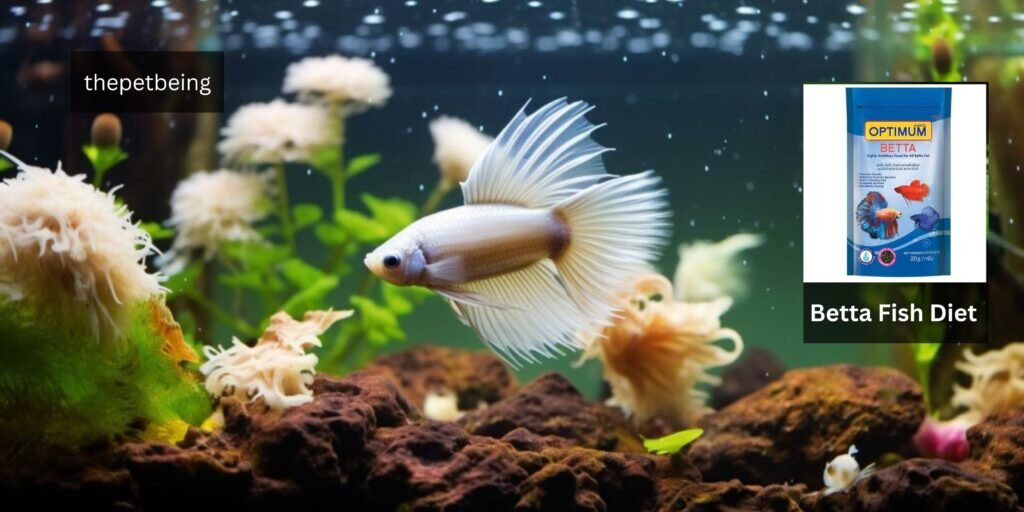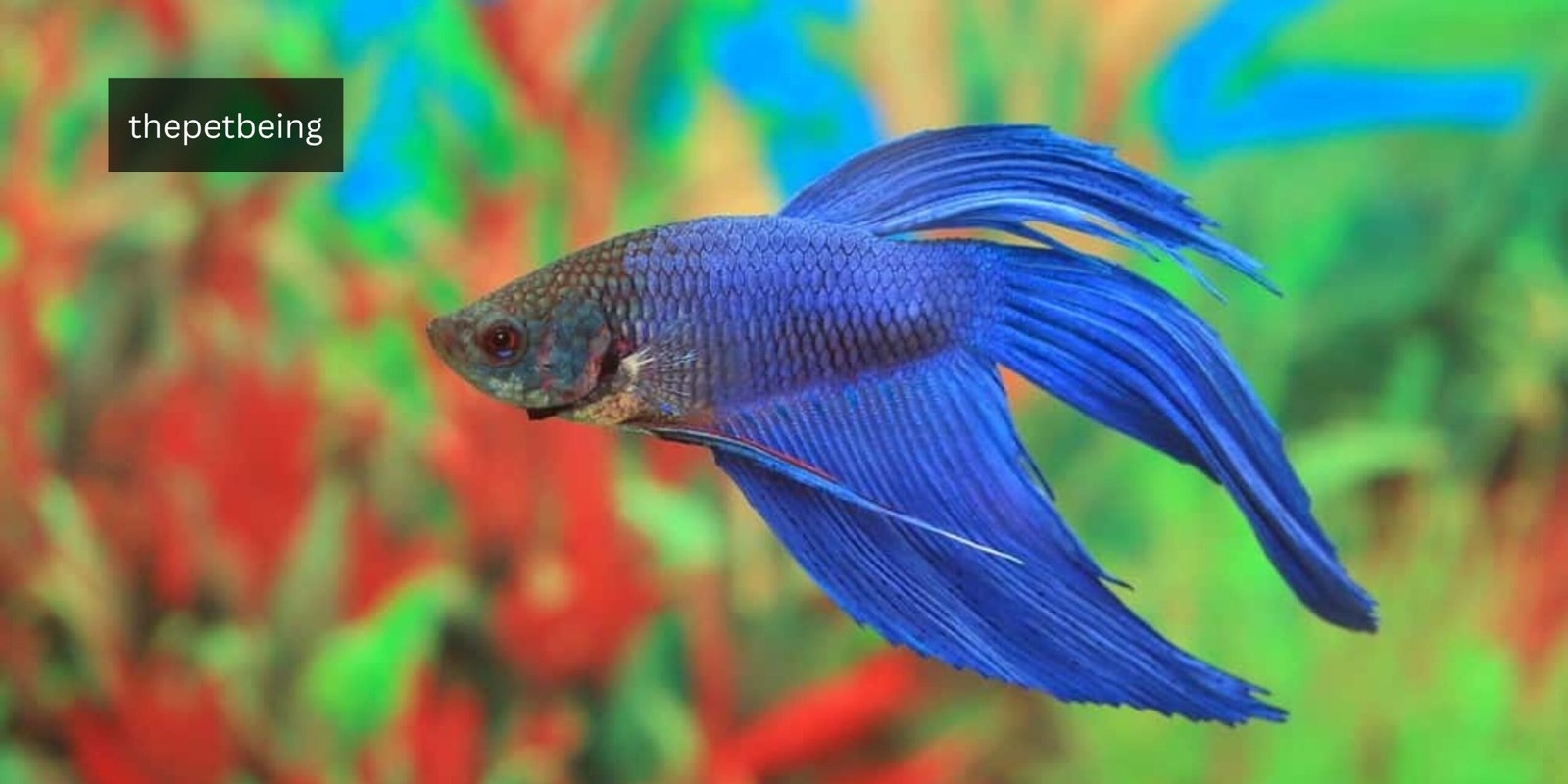Betta fish, those colorful and lively underwater friends, bring joy to many homes.
But, as good pet parents, we sometimes worry about their needs. One common question is, “How long can a betta fish go without eating?”
Most betta fish can survive 10 to 14 days without food. Despite their reputation as selective eaters, betta fish possess a stomach proportionate to the size of their eyes, which means they require only a minimal amount of food to sustain themselves.
In this detailed guide, we’ll explore this question and provide easy-to-follow advice on how to keep your betta fish happy and healthy, even when you can’t feed them as usual.
Understanding this is vital for any betta fish owner.
Betta fish, often called Siamese fighting fish, are cherished for their glaring colors and captivating personalities.
As dedicated pet owners, it’s natural to wonder about every aspect of their well-being.
Understanding Betta Fish Diet and Feeding Habits
- Betta fish have a unique way of eating, and it’s important to know what they like to eat and how to feed them properly.
- These colorful fish enjoy a diet of balls or flakes, especially for bettas.
- They could be more picky eaters, but providing them with high-quality food is essential to keep them healthy.
- Regarding feeding habits, bettas are known for their surface-feeding behavior.
- They’ll swim to the water’s surface to grab their food, so it’s best to shower the balls or flakes on the water.
- Understanding their feeding habits helps when you can’t be there to feed them, as you’ll know how to provide for their needs during your absence.
- Proper nutrition is the foundation of a happy and healthy betta fish.

How Long Can a Betta Fish Survive Without Food
Betta fish are tough and typically survive for about two weeks without food.
It’s essential to remember that this is not ideal for their health.
Several factors can affect how long they can last without food:
Age
The age of your betta fish plays a significant role in determining how long they can go without food.
Younger bettas may require more frequent feedings.
They may struggle to suffer an extended period without nutrition.
Health
The overall health of your betta fish is an essential factor.
A healthy betta can withstand longer periods without food than a sick or weakened fish.
Monitoring your betta’s health and addressing any issues instantly is essential.
Water Temperature
Water temperature directly affects a betta’s metabolism. In warmer water, bettas tend to have higher metabolic rates, requiring more frequent feedings.
On the other hand, cooler water temperatures may slow down their metabolism, allowing them to go longer without food.
Tank Size and Natural Food Sources
The size of the tank can also impact how long a betta can survive without food.
Larger tanks with more natural food sources, such as algae and microorganisms, can provide sustenance to your betta during your absence.
Tips for Leaving Your Betta Fish Without Food
If you plan to be away for an extended period and cannot feed your betta fish regularly, it’s crucial to take protection to ensure their well-being.
Automatic Feeders
Consider using automatic fish feeders.
These handy devices can distribute a controlled amount of food at scheduled times, ensuring your Betta gets its meals even when you’re not around.
Pre-Portioned Food
Before leaving, divide your Betta’s food into daily servings.
This prevents overfeeding by a well-meaning protector.
Who may need to be more familiar with your fish’s dietary needs?
Seek Help
Ask a trusted friend or family member to feed your Betta while you’re away.
Provide instructions regarding feeding quantities and schedules to ensure your fish’s well-being.
Maintain Tank Conditions
Before your departure, perform a water change and ensure the tank’s water parameters are stable.
This reduces stress for your Betta during your absence.
Place the tank in a quiet area away from direct sunlight and drafts to further minimize stress.
Limit Fasting Duration
While Betta fish can endure temporary fasting, keeping it as short as possible is essential.
Extended periods without food can negatively impact their health, so plan accordingly if you anticipate being away for more than a couple of weeks.
By following these straightforward tips, you can help ensure your Betta fish remains healthy and happy even when you can’t be there to feed them regularly.
Long-Term Considerations
While betta fish can survive for a limited time without food, it’s essential to consider their long-term well-being.
Extended periods of fasting can impact their health negatively.
Therefore, making arrangements for their care is vital if you assume being away for more than two weeks.
Tips for Keeping Your Betta Healthy While You’re Away
- Use an Automatic Feeder: These devices can feed your Betta at specific times so they don’t miss meals. It’s like having a fish-sitter.
- Portion Their Food: Before you leave, divide their food into daily pieces. This helps them get the right amount and avoid overeating.
- Get Help from Someone You Trust: If you have a friend or family member who can help, ask them to feed your Betta. Make sure they know how much and when to provide.
Keep the Tank Clean
Ensure the water in the tank is clean and good quality before you go. Clean water is like fresh air for fish.
- Regular Tank Care: The tank needs attention even when you’re not there. Continue with frequent water changes to keep their home nice.
- Choose a Good Spot for the Tank: Keep the tank calm, away from bright sun or cold drafts. This makes your Betta feel safe.
- Don’t Leave Them Hungry for Too Long: While Betta fish can go without food for a bit, it’s best not to make them wait too long. Try to plan your return or ask someone to help if you’ll be away for a while.
By following these steps, you can make sure your Betta fish stays happy and healthy while you’re away, and you can enjoy their company when you return.
Conclusion
In Betta fish, it’s essential to balance their needs and our schedules. We’ve learned that Betta fish can survive for around two weeks without food, but this could be better. Several things can affect this duration, like age, health, and water temperature. To keep our underwater friends happy, we’ve explored helpful tips for when we can’t feed them regularly. Automatic feeders, pre-portioned food, seeking assistance, and maintaining tank conditions are all ways to ensure their well-being. Ultimately, responsible Betta fish ownership means always considering their health and happiness. Even though they can manage short periods without food, we must provide the best care, planning for their needs and ensuring they stay healthy and content throughout their lives. So, let’s continue to enjoy the beauty and charm of our Betta fish while giving them the care they deserve.
FAQs
Can I use an automatic feeder to feed my Betta fish when I’m not around?
Yes, automatic feeders are a practical solution.
They can be programmed to dispense the right amount of food at scheduled times, ensuring your Betta receives proper nutrition, even when you’re away for a few days.
How can I ensure my Betta fish stays healthy while I’m away?
You can follow some simple steps to ensure your Betta fish stays healthy.
First, provide them with a clean and suitably sized tank; a clean environment is essential for their well-being. Make sure the water temperature is suitable and consistent, usually around 78-80°F (25-27°C).
Second, feed them a balanced diet of high-quality Betta fish pellets or flakes. Overfeeding can be harmful.
Third, maintain a regular feeding schedule. Bettas thrive consistently, so try to feed them at the exact times each day.
Do betta fish sleep?
Yes, Betta fish do sleep. They have sleep patterns similar to other animals but might look slightly different because they live in water.
Betta fish are known to rest, relax, and sleep at the bottom of their tank or hide among plants or decorations.
What happens if a betta fish doesn’t eat for a day?
If a Betta fish doesn’t eat for a day, there’s no need to worry too much.
Betta fish are flexible creatures and can go without food for short periods without immediate harm.
Do betta fish need 24-hour light?
No, Betta fish do not need 24-hour light.
They do better with a regular day-night cycle, just like in their natural habitat.
Betta fish need a consistent light and dark pattern to maintain their health and well-being.
Too much light for too long can stress them out and disturb their sleep.
Can betta fish eat any human food?
Betta fish should not eat most human foods.
They have specific dietary needs, and feeding them the wrong things can make them sick.
These foods have the proper nutrients they need to stay healthy.
Feeding them human food, like bread or meat, could be better.
It can cause digestive problems and even harm their little bodies.
















